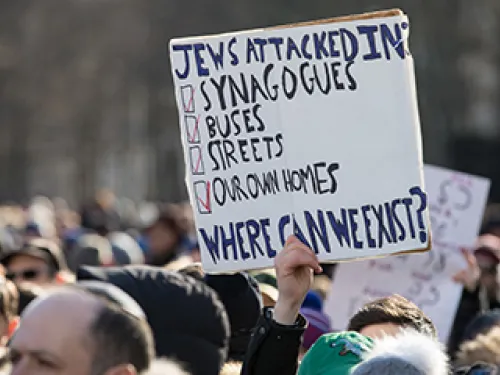
Related Resources:
About this Report
This report is ADL’s annual assessment of anti-Israel activism on American college campuses. Our goal is not to document or quantify routine criticism of Israel’s actions or policies, but to provide a snapshot of a more radical activist movement which places opposition to Israel and/or Zionism as core elements of campus life or as a prerequisite for full acceptance in the campus community.
Our snapshot is composed of hundreds of individual incidents that have been documented by ADL. These incidents can include verbal or written harassment of Zionists or Israelis, efforts to coopt campus institutions to support BDS movements, anti-Israel protests that affect the campus, events that feature radical anti-Israel messaging and programming and the dissemination of rhetoric or policies that marginalize, demonize or exclude Jews, Zionists or Israelis from campus life.
Many of the incidents described in this report are antisemitic in intent or in effect. While other incidents may not be antisemitic, collectively they may contribute to a more hostile campus environment for Jewish students.[1]
Not everyone involved in the incidents described in this report may identify as part of an anti-Israel activist movement. But when they espouse rhetoric or tactics identical to those employed by anti-Israel activists, their actions become indistinguishable from them.
ADL researchers gathered the incidents featured in this report primarily using open-source research methods. Much of our data on campus anti-Israel incidents was compiled by diligently following the social media accounts of anti-Israel activists themselves. Other information came from student newspapers and other news media; we also gleaned important insight from the work of other organizations, including the Israel on Campus Coalition (ICC), Hillel and AMCHA. In cases where we obtained information from the media or from third parties, we always sought out primary sources to substantiate the reporting. We did not include incidents which we felt lacked evidence or credibility.
Other information on campus anti-Israel activism was reported directly to ADL by victims and constituents. Some of it was relayed through our partners including Hillel International, the Secure Community Network, Chabad, Community Security Initiative, the Israel on Campus Coalition (ICC) and others. ADL professionals assessed each one of these reports for evidence and credibility.
This report is a snapshot; it is not comprehensive or scientific. It is also certainly an undercount. Many anti-Israel activists do not post their activities on social media; some victims of anti-Zionism-related harassment may not have come forward; some incidents may not have been covered by campus press. To get a complete picture of the state of anti-Israel activism on campuses, it is important to supplement this incident-based, open source-oriented report with other research, including public opinion polling and surveys of the lived experiences of American Jewish college students.
Introduction
For decades, a small but vocal segment of U.S. student groups and faculty have espoused anti-Israel and anti-Zionist views. Anti-Israel rhetoric and activism can span the spectrum from legitimate critiques of Israeli government policies to anti-Zionism, the denial and vilification of the right of Jewish self-determination and statehood anywhere in the Land of Israel, which is antisemitic at its core, to the propagation of classic antisemitic tropes. Over the past several years and through the 2021-2022 academic year, the prominence of anti-Israel and anti-Zionist activities on campus appears to have grown.
Troublingly, the antisemitic vilification of Zionism and ostracization of Zionists has emerged as a common phenomenon within some campus spaces. Zionism, broadly defined as the movement for Jewish self-determination and statehood in the Jewish people’s historic homeland in the Land of Israel, is increasingly seen by left-wing campus activists as unjustifiable or illegitimate. The trend of targeting Jewish students who publicly express support for Israel’s existence as a Jewish state animated much of the worst anti-Israel activity during the 2021-2022 academic year.
More broadly, anti-Israel animus manifested in various ways during the 2021-2022 academic year, including: accusing Israel of committing genocide or ethnic cleansing; labelling Israel a “settler-colonial” state or “apartheid state;” calling for Boycott, Divestment and Sanctions (BDS) against Israel and Israel-based companies; and supporting violence or a military confrontation with Israel.
At times, classic antisemitic tropes were espoused, such as those relating to Jewish/Zionist money or control over the media or political affairs. Antisemitism also manifested when Zionists were verbally harassed or denigrated as inherently racist; or when pro-Israel and Zionist students were deemed unfit for participation in the campus community. A majority of American Jews feel attached to Israel or view a relationship with Israel as part of their Jewish identities.
While these trends persist, there are vibrant Jewish communities on campuses across the United States which enable Jewish students to freely explore and express their Jewish identity. Numerous on and off campus organizations support students who might be affected by virulent anti-Israel activity, including Hillel (the premier Jewish student organization in the United States), Chabad, Students Supporting Israel (SSI), Stand With Us, J Street U and many others. And while many administrations could do much more to counter the tide of anti-Zionist activity affecting Jewish students, a significant number have spoken up and addressed these issues effectively. ADL strenuously advocates for universities to take more action to support Jewish students and to call out antisemitism when it arises.
Criticism and debate over the policies of the State of Israel—like criticism of any country—is part of a healthy campus ecosystem. The First Amendment protects the right to boycott, as well as to engage in harsh and divisive rhetoric. Yet as antisemitic incidents have surged in recent years, we must be aware of possible links between hateful rhetoric and violence; and students and faculty of all political stripes must do their best to engage in healthy and respectful dialogue.
Major Findings
ADL tallied 359 campus anti-Israel incidents during the 2021-2022 academic year: one physical assault; 11 instances of vandalism; 19 instances of harassment; 143 events; 165 protests/actions; and 20 BDS resolutions and referenda. Many but not all incidents may be characterized as antisemitic.
Physical attacks
There was one Israel-related physical attack during the 2021-2022 academic year. Physical attacks are defined as acts of violence against one or more people during which the perpetrator mentions Israel/Zionism or is acting as a member of an anti-Israel group or participant in an anti-Israel event. On April 18, while participating in a protest against Israeli military action organized by Students for Justice in Palestine (SJP) at University of Illinois, Urbana-Champaign, a student threw a rock at a group of Jewish students gathered by the campus Hillel. No one was hurt and the building was not damaged. The student is being charged with a hate crime. Such an attack against Jews gathered at a Jewish institution is a blatant act of antisemitism.
Vandalism
There were 11 reported cases of Israel-related vandalism on campuses during the 2021-2022 academic year. Vandalism is defined as unauthorized destruction of property on campus in which Israel/Zionism are referenced in a derogatory manner. It does not include graffiti or art in campus areas designated for that purpose. In some instances, pro-Israel signs were defaced with pro-Palestinian messages. Most concerning, however, was the targeting of Hillel, the premier Jewish student organization on U.S. campuses. On four occasions, vandals left graffiti or anti-Israel paraphernalia on or near a Hillel. Anti-Israel vandalism or graffiti which occurs on the property of a Jewish institution (such as Hillel or Chabad) may be considered an antisemitic incident. Examples of vandalism included:
- December 3, 2021: A post outside the University of Oregon Hillel building was found vandalized with the following: “Free Palestina[sic] You genocidal rasist[sic] fucks anad[sic] lives matter."
- September 10, 2021: A 9/11 memorial at Michigan State University depicting an American flag and the words "Never Forget 2,977 Lives" was defaced to read "Israel Forget 2,977 Lives," evoking the conspiracy theory falsely blaming the terrorist attacks on Israel.
- June 4, 2021: Red handprints were painted outside the Hillel at the University of Michigan, in an apparent attempt to implicate Hillel, or possibly the campus Jewish community as whole, in the bloodshed allegedly perpetrated by Israel.
Targeted verbal or written harassment
The 19 recorded cases of Israel-related harassment against individuals or small groups were often characterized by individuals hurling incendiary, degrading and/or exclusionary language at others who self-identify as Zionist or pro-Israel. Targeted verbal or written harassment is defined as digital or in-person hateful language, including threats, that reference Israel or Zionism and which target a specific person, group of people, or Jewish institution. In one case, a Hillel employee received a litany of antisemitic messages on social media after posting about a terror attack in Israel, with one message calling for Jews to die.
- April 22, 2022: A group of people stopped their cars in front of a Jewish fraternity at Rutgers University and harassed residents of the house while waving Palestinian flags.
- April 11, 2022: The Israel Fellow for the University of Rutgers Hillel received multiple antisemitic Instagram comments in response to a video they posted regarding a terror attack in Israel. One comment read, "die jews die."
- February 10, 2022: A college student blocked a Jewish student's entry into her friend's dorm room, demanding that she say, "Free Palestine."
- July 1, 2021: After a pro-Israel Jewish student asked fellow students on a course-related group chat to promote anti-Israel materials on a separate chat unrelated to academics instead, the individual received several texts that ranged from "zionist killer" to "you are the problem in the world today" and "you do not deserve to be at CUNY."
Anti-Israel events
The second most frequent form of anti-Israel activity, anti-Israel events, took place 143 times (excluding rallies) during the 2021-2022 academic year. These include panels, speakers, conferences, webinars and more. Some of the most popular events included ‘BDS 101’ sessions. As in previous years, anti-Israel events spanned the spectrum from mainstream criticism of Israeli policies, to the antisemitic denial of the Jewish right to self-determination in the Land of Israel, to classic antisemitic ideas and support for violence.
Author and activist Mohammed El-Kurd spoke at many events. As a Palestinian whose home in the Sheikh Jarrah neighborhood in East Jerusalem is under constant threat of eviction, El-Kurd understandably has strong views about the Israeli-Palestinian conflict. However, El-Kurd also has a pattern of espousing antisemitic tropes and rhetoric in support of violence, particularly on his social media. El-Kurd's presence made some Jewish students fear for their safety. For example, in an article in the student newspaper at American University on March 17, 2022, some Jewish students reported their shock and trepidation that someone with a history of antisemitism would be invited to speak on campus. Similarly, on March 31, after it was reported that the student government at Duke University allocated a $5,000 honorarium for El-Kurd to speak on campus, the president of Duke’s Students Supporting Israel called for the honorarium to be rescinded, expressing concern for her safety.
Other notable events included:
- May 10, 2022: SJP at DePaul University held an event on “greenwashing,” or the idea that Israel’s advancements in environmental conservation should be seen as a premeditated Israeli strategy to deflect attention from Israel’s alleged persecution of the Palestinians. Such events have been popular in anti-Israel circles for years.
- April 13, 2022: During a lecture delivered by Rutgers University Professor Noura Erakat entitled “Zionism as Racism and Racial Discrimination” at University of Illinois, Erakat repeatedly expressed complete opposition to Israel’s right to exist and shared her approval for military campaigns to end Israel’s existence. She also suggested Zionism is a “bedfellow” to Nazism. The lecture was in part sponsored by the university’s Diversity, Equity and Inclusion Office, which distanced itself from the event.
BDS resolutions/referenda
Support for the Boycott, Divestment and Sanctions (BDS) movement against Israel continues to be a central feature of the campus anti-Israel movement.
The official BDS movement calls for an economic boycott, which targets Israeli companies that they claim contribute to alleged human rights violations against Palestinians; an academic boycott, which prohibits exchanges with Israeli educational institutions and affiliated academics; and a cultural boycott, which targets Israeli “cultural institutions,” such as Israeli artists and performers (as well as calling for cultural figures to not perform or appear in Israel). The BDS movement also targets “lobby groups” and those they allege to be “complicit” in Israeli government activity in this category, a category which increasingly consists of Jewish people and institutions as a whole.
- Thirteen out of 20 BDS resolutions that were put to a vote during the 2021-2022 academic year passed. Two of the passed resolutions either were not signed by the appropriate bodies or were nullified. While nearly all resolutions were voted on by student governments, one resolution, at Princeton University, was presented to the entire student body for a vote in a referendum. It failed by a narrow margin. A particularly divisive and inflammatory BDS resolution was passed by CUNY Law in late 2021. Organized by CUNY Law SJP and the Jewish Law Student Association, the resolution called for the university to “cut all ties” with Hillel and an array of other predominantly Jewish pro-Israel campus organizations. The resolution also targeted Boeing, General Electric, Lockheed Martin and other corporations in which CUNY holds investments.
- None of the resolutions were implemented by university administrations. While university administrations typically do not adhere to the demands of BDS resolutions, resolutions with language targeting Zionism and pro-Israel groups on campus have the effect of making members of the campus Jewish community feel targeted and unsafe.
Protests/Actions
Constituting the most popular type of anti-Israel activity were 165 protests and actions undertaken by student campus groups or faculty. These activities ranged in nature from classic protests and demonstrations in the campus quad, to the dissemination of anti-Israel leaflets and fliers, to heckling, blocking or disrupting pro-Israel speakers or events. Public efforts to marshal support for BDS and to promulgate inflammatory content also occurred. Other initiatives included the display of mock “apartheid walls” to depict the Israeli security barrier that runs largely along the so-called 1967 Green Line and within the West Bank. SJP chapters and other groups erected 17 such walls at universities including Boston University, University of Minnesota and Harvard University.
Letters, statements and petitions by SJP and Jewish Voice for Peace chapters were common. These actions often demanded that universities halt partnerships with Israeli academic institutions, cancel Israeli speakers or sever ties with Israeli companies.
Protests and actions of note included the following:
- June 2021: JVP at University of California, Berkeley protested with anti-Zionist group Palestinian Youth Movement at the offices of MZ Foundation, accusing Hillel Silicon Valley, Chabad and others of being responsible for genocide and ethnic cleansing of Palestinians due to their receipt of gifts from the foundation.
- March 14, 2022: A BDS petition launched by Tufts SJP asked fellow students to boycott a broad array of campus Zionist and pro-Israel programs and groups, including left-wing J Street. The petition focused almost solely on Jewish groups and ignored others that support Israel, such as conservative or Republican groups.
- March 6: SJP at the University of Wisconsin, Madison protested outside of the campus Hillel to express opposition to its Birthright program, a free trip to Israel for young Jewish individuals. SJP posted a video of their demonstration on social media alongside text reading: "Birthright is propaganda that manipulates Jewish heritage and identity into support for the Israeli apartheid state."
- February 5, 2022: Representing Jewish Voice for Peace, Professor Whitney Strub published an open letter to President Holloway protesting Rutgers Newark's Memorandum of Understanding with Tel Aviv University.
- February 3: SJP at American University released a statement demanding the university cancel an upcoming talk with former Israeli Foreign Minister Tzipi Livni.
- October 7: SJP UIUC led a walkout during an event featuring Israeli-American author Yossi Klein Halevi and coexistence group Givat Haviva's Mohammad Darawshe. As the students left the room, they held signs reading “stop normalizing genocide.”
- October 9, 2021: Extreme anti-Israel activist Abbas Hamideh spoke at a rally hosted by Cleveland State University's Solidarity for Palestinian Human Rights (SPHR) student group. Hamideh stated that "European invaders of Palestine are not Semitic;” lambasted the "pro-Israel lobby" in the U.S. that "needs to be stopped," explicitly naming the "local Jewish Federation in Beachwood;" and remarked that the occupation has been ongoing for 74 years (indicating a complete rejection of the existence of Israel, which was founded in 1948).
Main Anti-Israel Campus Groups
Several anti-Israel organizations are active on campus, but the most visible and organized are Students for Justice in Palestine (SJP) and Jewish Voice for Peace (JVP). During the 2021-2022 academic year, 225 anti-Israel incidents originated from SJP, by far surpassing JVP’s 19. Other groups were responsible for a smaller fraction of anti-Israel incidents, including nine from Harvard Out Of Occupied Palestine (HOOP) and six from Palestinian Youth Movement (PYM). San Francisco State University’s AMED Studies department, Centers for Middle Eastern Studies and the Muslim Student Association were responsible for four apiece. Young Democratic Socialists of America (YDSA), CUNY for Palestine, Within Our Lifetime (WOL) and the Palestine Solidarity Committee (PSC) accounted for three apiece. In most cases, anti-Israel activity was perpetrated by people with no formal affiliation with an anti-Israel group.
- Students for Justice in Palestine (SJP), the most prominent and active anti-Israel and anti-Zionist student group, consists of approximately 206 chapters across the country, mostly concentrated in the Northeast, Midwest and California (21 chapters are based in Canada). Its total number of chapters in the United States in 2022, as reported on National SJP’s website, represents an increase of about 25 chapters since the 2020-2021 academic year. The group organizes lectures and rallies; disseminates propaganda via its social media accounts and campus newspapers; organizes anti-Israel BDS resolutions and petitions on campuses, and more. A significant segment of SJP’s rhetoric is combative and inflammatory, and some chapters have a pattern of incorporating antisemitic tropes, expressing support for violence against Israel and engaging in virulent campaigns that target Zionist students and campus groups.
- Jewish Voice for Peace (JVP) is also active on campus. JVP is a radical anti-Israel activist group which mostly works in the larger community, but which has several campus chapters. Its campus chapters often work closely with SJP in organizing some of the activities outlined above. JVP strenuously advocates for the eradication of Zionism and a connection to Israel from the lives of Jews worldwide. They view it as unacceptable that fellow Jews identify with Zionism, which they see as racist and a form of “Jewish supremacy.”
Themes and Trends
Demeaning and Ostracizing Zionists and Zionism
Zionism and Zionists continued to be commonly associated with racism by campus activists, including those affiliated with SJP and JVP. The words “Zionism” and “Zionist” were routinely invoked in a pejorative manner to demean, disparage and attempt to ostracize many Jewish students. Some claimed one cannot be a feminist and a Zionist or that Zionism and Zionists are inherently linked to white supremacy. One speaker went so far as to declare that “Zionism is inhuman.”
Jewish and Zionist students were often held responsible for alleged human rights abuses committed by the state of Israel against the Palestinians, which at times led to harassment. In two instances, Hillel, the premier Jewish student organization on U.S. campuses, received threatening phone calls condemning Israel. On at least three occasions, groups declared that Zionism or Zionists should not be allowed on campus or should be shunned from the campus community.
In at least two cases, student groups expelled members due to their “Zionism.” In February 2022, a student testified that she was harassed on campus and dismissed from her a cappella group for being a Zionist. Also in February 2022, two members of a support group for sexual assault survivors were forced to resign from the group due to their self-identification as Zionist.
In March 2022, Tufts SJP circulated a petition asking fellow students to boycott “groups that benefit and normalize Israel,” naming almost solely campus Jewish groups: Friends of Israel, J Street U Tufts, Birthright, Visions of Peace, Tisch Summer Fellows Anti-Defamation League internship and TAMID. The petition ignored the wide array of non-Jewish groups on campus that similarly support Israel, causing much of the campus Jewish community to feel under siege.
On three occasions, anti-Israel student groups (usually SJP chapters) held protests outside of Hillel facilities. In four cases, unknown individuals went so far as to vandalize Hillel property. Protesting outside a Hillel may be considered tantamount to holding the campus Jewish community responsible for the alleged actions of the Israeli state. In one instance in June 2021, someone in a vehicle passing Hillel at Princeton University yelled "Free Palestine" at a group of Jewish students and faculty who were preparing to begin religious services on the lawn.
The net effect of these trends was that Jewish students who publicly expressed affinity with Israel’s existence were more likely to have a difficult time being accepted in many campus spaces, especially in progressive and left-wing circles. Some students may feel forced to hide their connection to Israel in order to be accepted in such spaces.
The wide variety of incidents indicates that exclusionary and discriminatory anti-Zionist ideas and practices are not confined to any one area on campus, such as the classroom, social media or in official initiatives by activists:
- “Dirty, racist Zionist.”
- Unknown students to a Jewish student on social media at the University of Michigan, June 2021
- “Don’t take sh*tty Zionist classes: Support the Palestinian movement for liberation by boycotting classes on Israel or those taught by Israeli fellows.”
- SJP at University of Chicago, January 2022.
- “Zionism=racism.”
- Banner hung over bridge by Drexel SJP, May 10, 2022
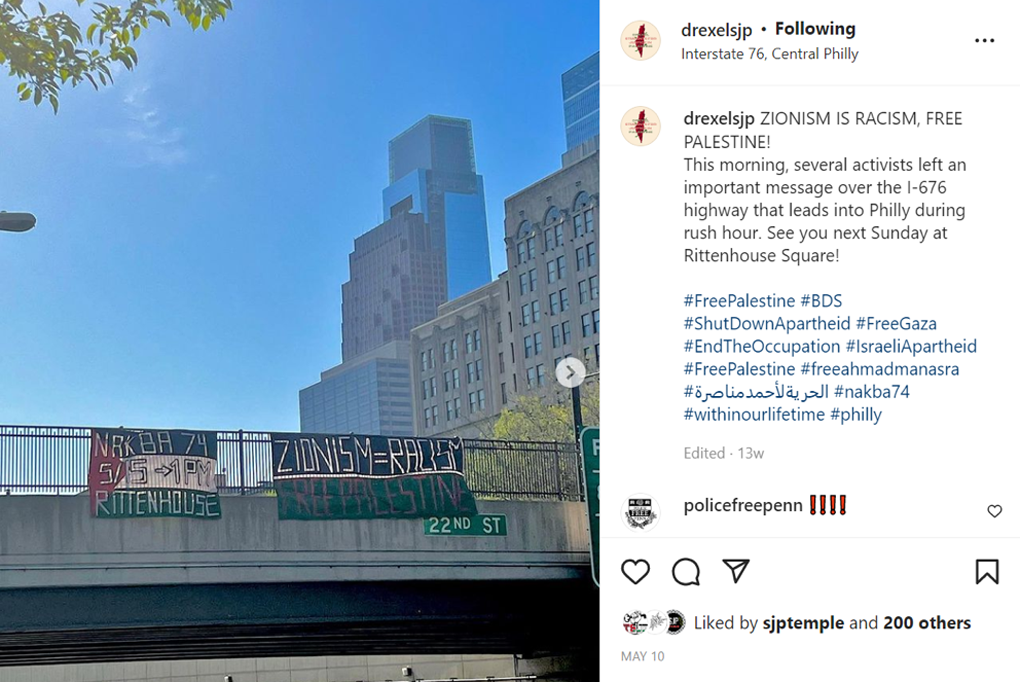
- “Zionism is racism settler colonialism white supremacy apartheid.”
- Harvard Palestine Committee, April 2022.
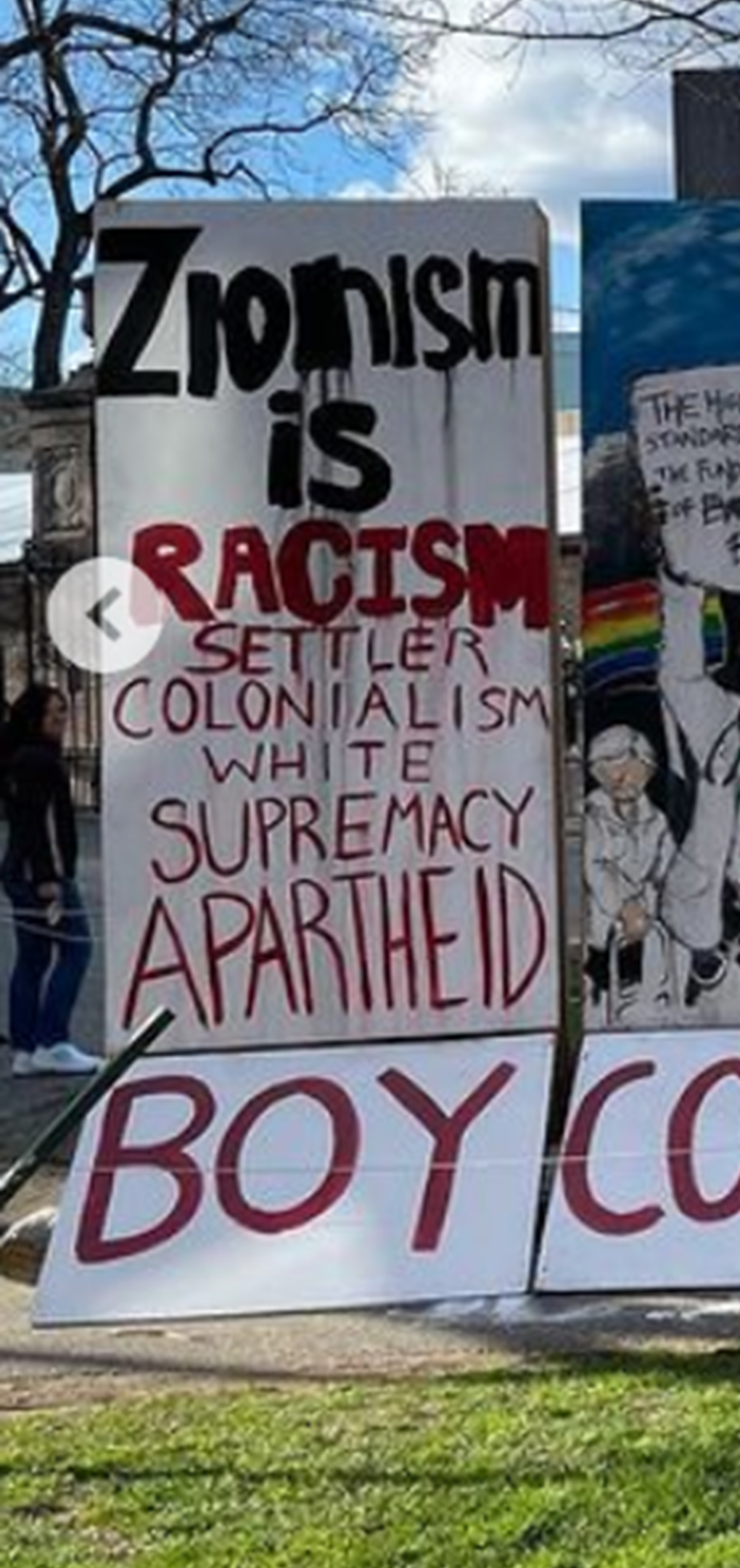
- “You cannot be a Zionist and an anti-racist.”
- “You cannot be a Zionist and a feminist.”
- “You cannot be a Zionist and an environmentalist.”
- Campus signs posted by Swarthmore SJP, April 2022.
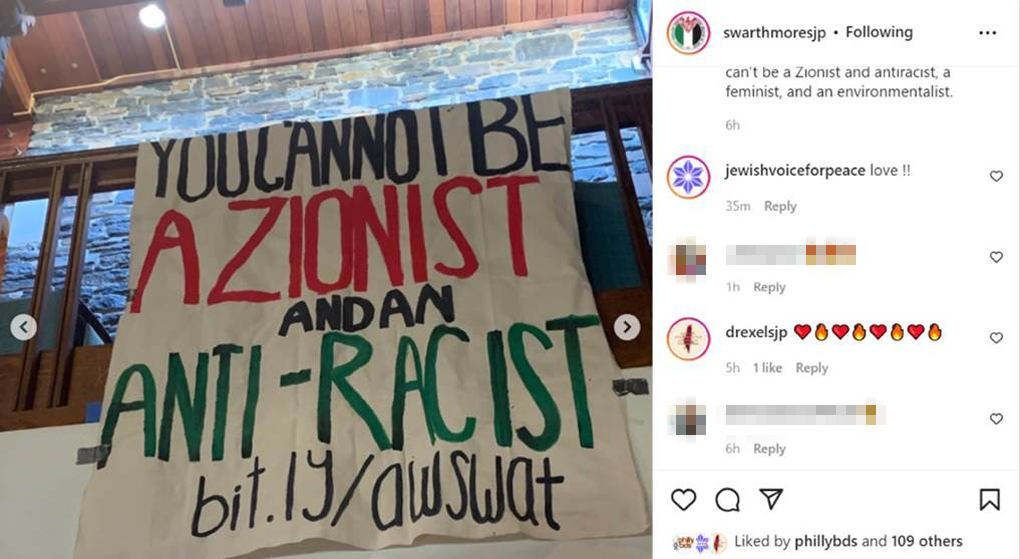
- Campus signs posted by Swarthmore SJP, April 2022.
- “Zionism is better understood as a political and intellectual analog of apartheid in order to emphasize that Israel did not become a discriminatory regime but is defined by such discrimination.... Jewish supremacy is not an unintended feature of hawkish politicians – it is a constitutive feature of the Zionist project across the Israeli political spectrum.”
- Rutgers University Professor Noura Erakat, July 2021.
- “FUCK...Zionists.”
- Sign posted by Washington University Black and Palestinian Liberation (WashUBPL), October 3, 2021.
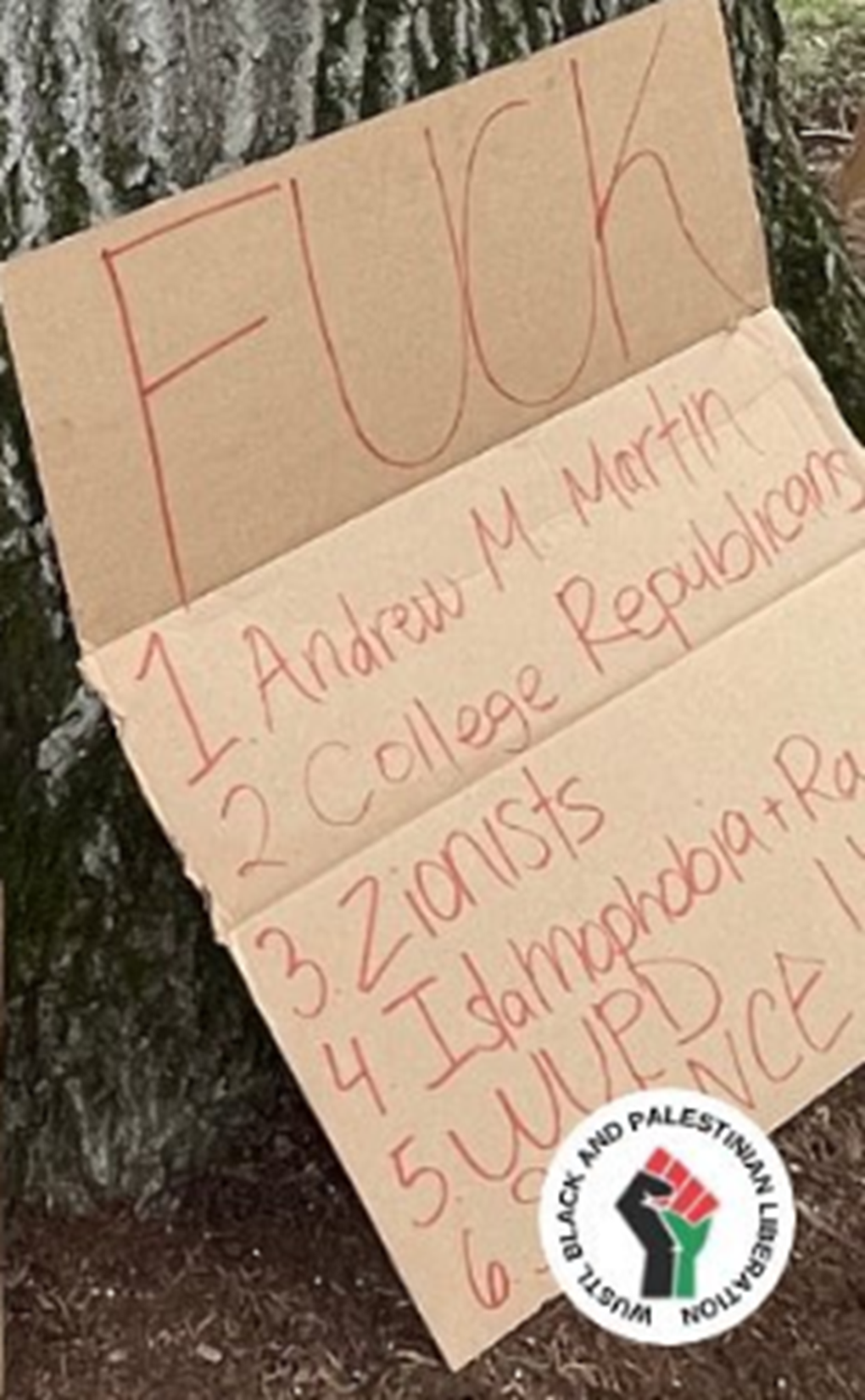
- “UC Zionism” written with blood dripping down some letters.
- SJP UCLA, April 10, 2022.
- “Some things need to be simplified. For example, Zionism is inhuman.”
- Steven Salaita, March 26, 2022, Virginia Tech
- “Our communities suffer from constant racial trauma and micro-aggressions from White supremacists and Zionists.”
- South West Asian and North African Faculty and Staff Association, North Orange County Community College, May 12, 2022
- “Accepting money from a Zionist legitimizes Zionists as a source of funding and promotes the acceptance of a racist ideology that we cannot allow.... We cannot aim to advance our own liberation if we allow our spaces to be infiltrated by those who support and invest in our oppressors.”
- UCLA SJP, February 20, 2022
- "Demand that Zionist Professors are not welcome on your campus, demand that Zionist students are not in spaces where Palestinian students are, because Zionism is a threat, Zionism is a genocidal threat to us.
- A speaker at a rally sponsored by CUNY Law SJP, March 2022
- “The lack of regard for human life should be more than enough of a reason to NOT welcome Zionists at our diverse university.”
-Feb. 25, 2022: SJP at University of Illinois, Chicago
- “I can't believe our school platformed a f*cking Zio!.”
- A student attending a walkout for survivors of sexual assault complaining about a Holocaust survivor who had spoken the prior night, April 28, 2022
- “Zionism is not welcome on campus. #ZionismoutofCUNY.”
- May 3, 2022: Brooklyn College SJP and Within Our Lifetime posted on Instagram
- “To fight against sexual violence, we must oppose all forms of oppression. This includes the ethnic cleansing of Palestinians. Supporting a settler-colonial state goes against what we stand for and thus we cannot organize with members who do so.”
- New Paltz Accountability (sexual assault survivors' group), February 10, 2022.
Support for terror/violence
A notable segment of anti-Israel activists and professors expressed support for armed confrontation with Israel. These articulations ranged from justifying violence against the Israeli military to the lionization of all violence against Israelis, civilians included. As in previous years, the dissemination of stylized images of Popular Front for the Liberation of Palestine (PFLP, a U.S. State Department-designated terrorist organization) member and terrorist Leila Khaled holding a rifle was among the most common ways campus activists conveyed their support for armed confrontation with Israel. Also popular was language that advocated “resistance by any means necessary,” which suggests acceptance of all violence, even against civilians. In at least one instance, a speaker at a department-sponsored event (at Brown University) attempted to argue that Hamas violence against Israel should be seen in a positive light.
-
- May 3, 2022: SUPER UW (an anti-Zionist student group at the University of Washington) and Seattle University SJP advertised t-shirts, tote bags, sweatshirts and stickers depicting an image of PFLP leader and terrorist Leila Khaled holding a rifle.
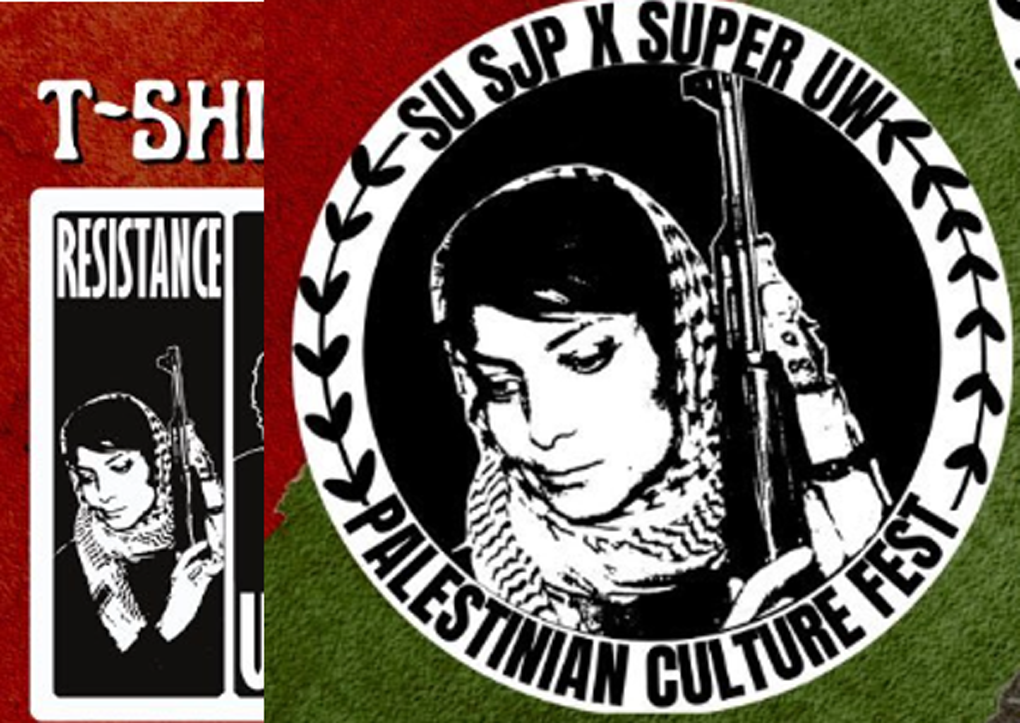
- April 22, 2022: SUPER UW published an op-ed in the student newspaper which supported “the right of Palestinians to resist occupation by any means necessary.”
- Nov. 9, 2021: The Brandeis Leftist Union published an image of an individual holding a rifle next to the PLFP logo.
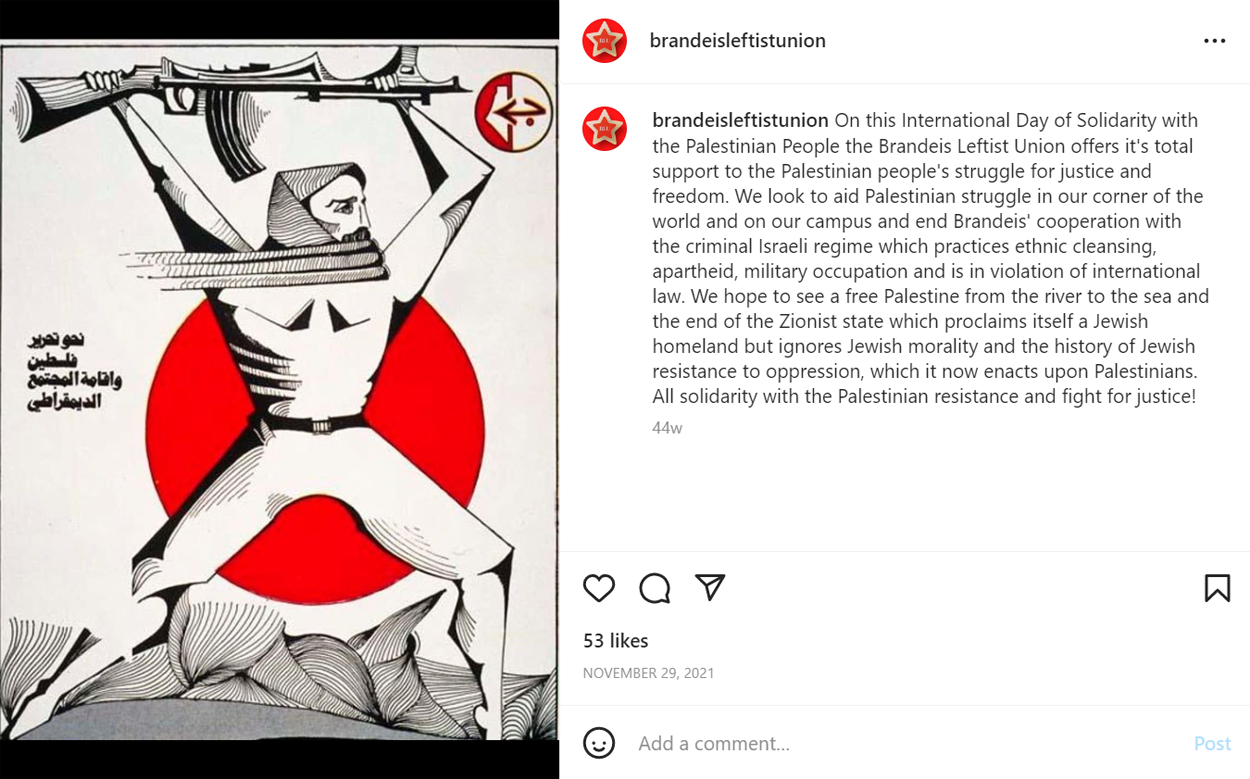
- April 7, 2022: John Jay SJP posted a graphic that included a message strongly suggesting that violence undertaken by Palestinians should never be labeled as “terrorism” and should only be referred to as “resistance:”


- Feb. 1, 2022: In a social media post by Washington University Black and Palestinian Liberation (WashUBPL), the campus Birthright program was compared to Patriot Front, a white supremacist organization. The post declared, "Death to all forms of Settler Colonialism!"
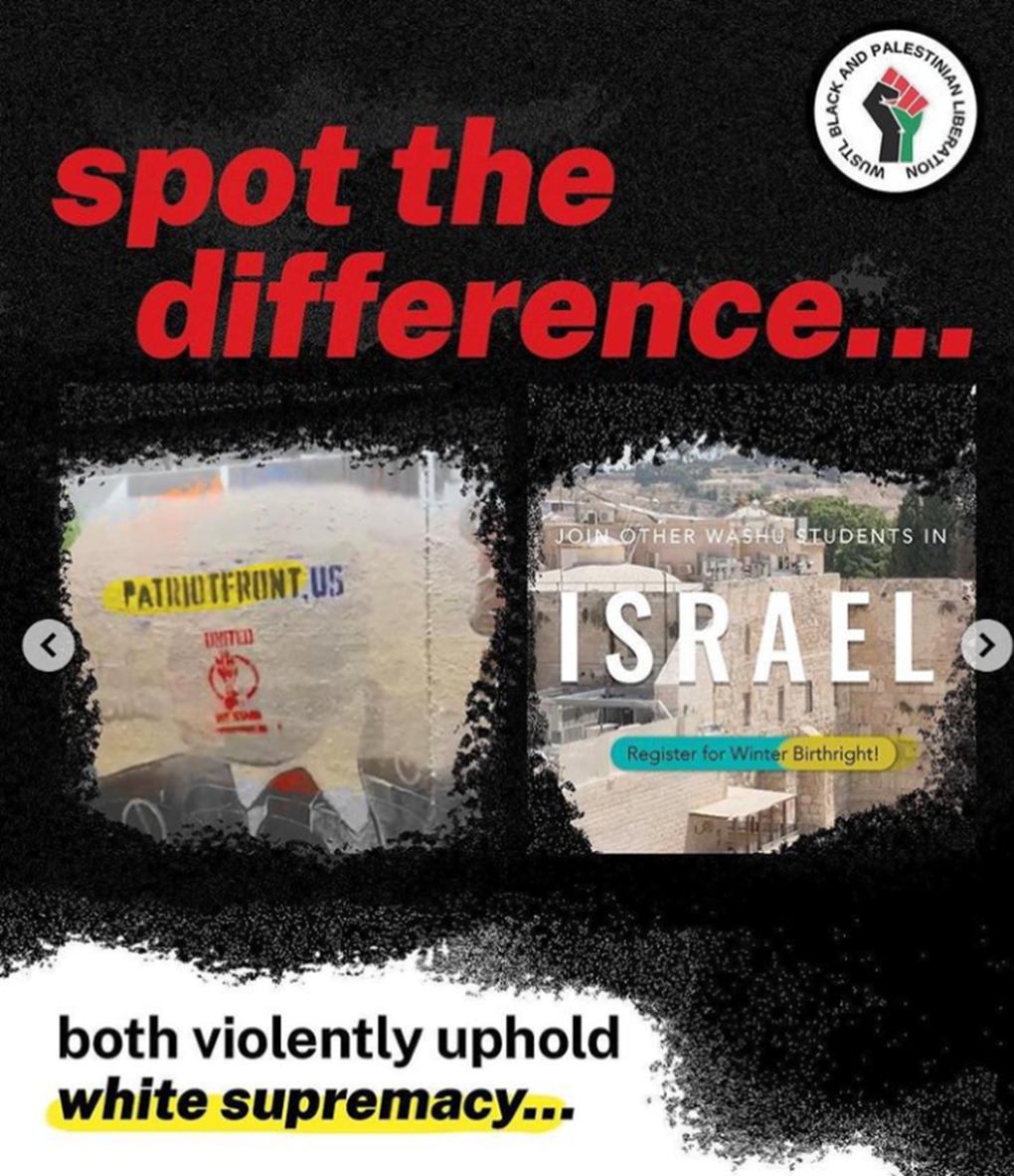
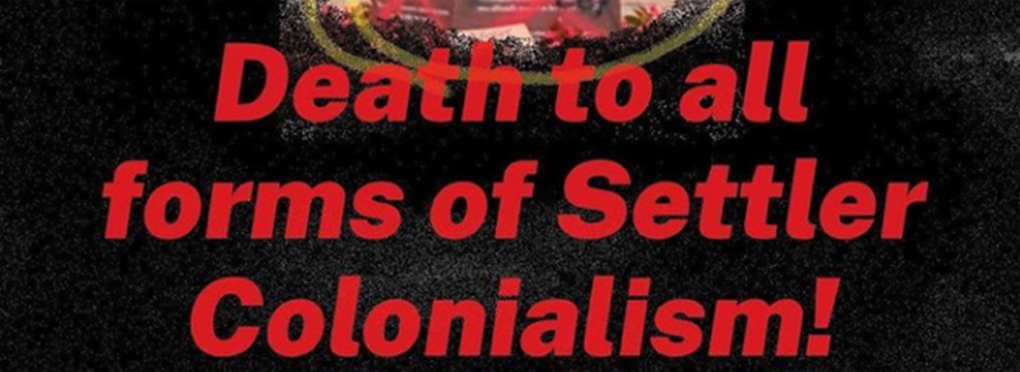
- Sept. 9, 2021: During a webinar entitled “Decolonizing Higher Education: Pedagogy, Curriculum, and Organizing: A Teach-In" organized by the Cross CUNY Working Group Against Racism and Colonialism, an activist with Brooklyn College SJP and CUNY for Palestine wore a shirt with an image of Leila Khaled carrying a rifle.
- July 10, 2021: A rally hosted by Drexel SJP and Swarthmore JVP featured the PFLP flag, a photo of which Swarthmore JVP posted on their Instagram account.
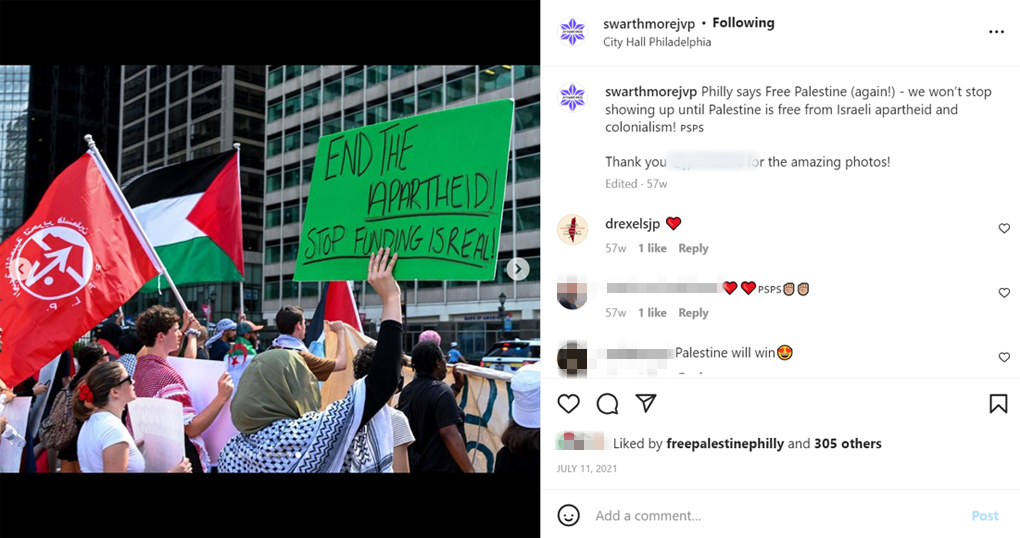
- November 12, 2021: During a talk at Brown University hosted by a department, author Somdeep Sen stated:
- “...what I'm doing is I'm breaking through that stigma, and I am comparing Hamas to liberation movements that you know, retroactively, we've sanctified as a good thing.”
- November 2021: SJP at the University of Chicago released a zine, or student-generated activist pamphlet, with an image depicting two Molotov cocktails and the text, “Cheers to Intifada.”
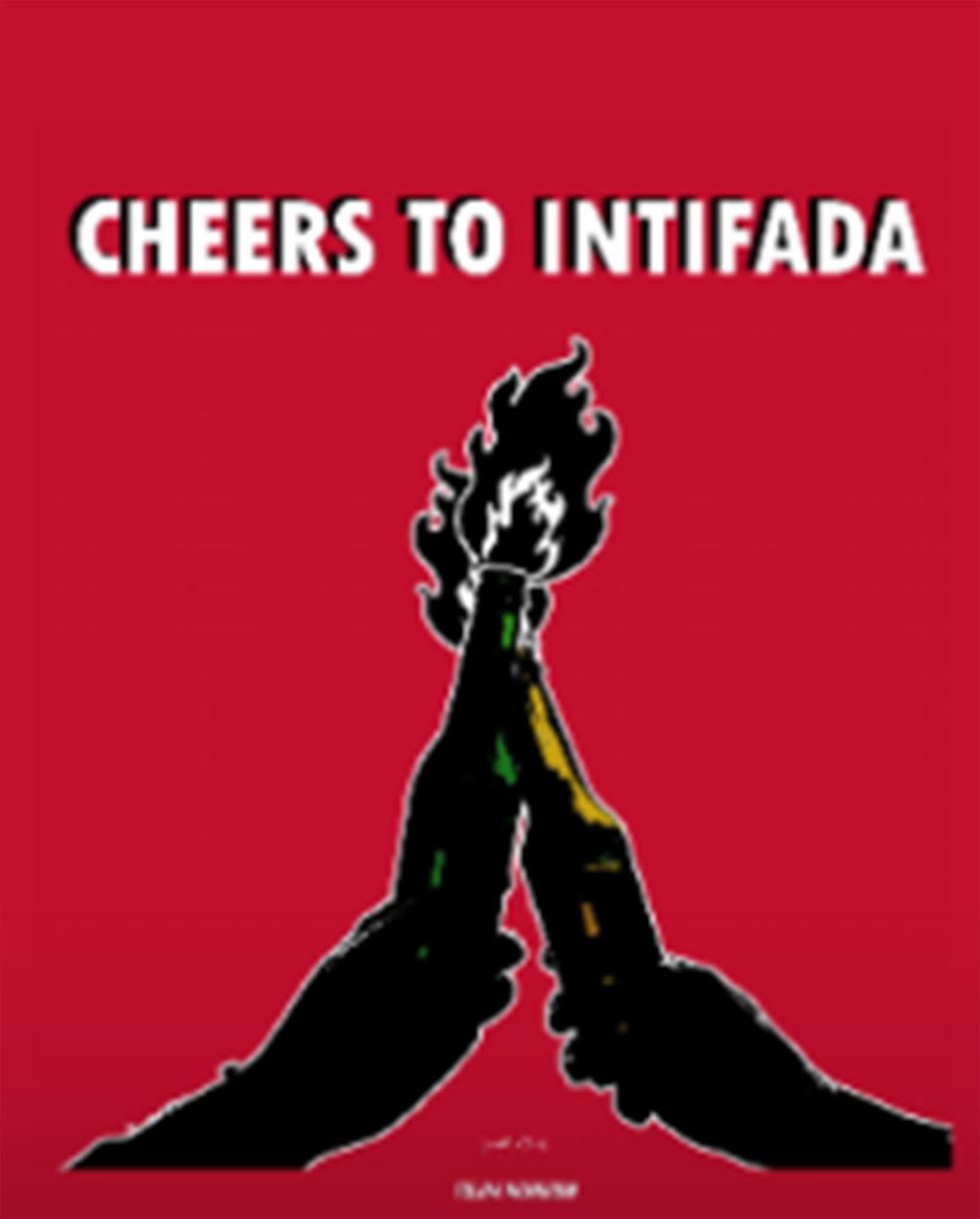
- September 2, 2021: SUPER Michigan State University posted an image of PFLP member Leila Khaled carrying a rifle with the text, “long live free Palestine.”
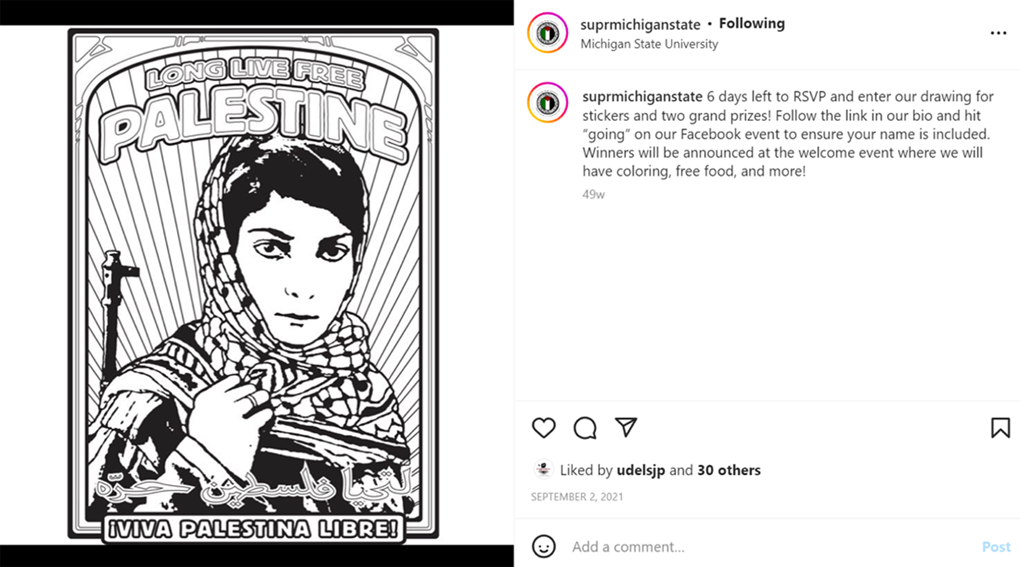
Classic Antisemitic Tropes
Occasionally, academics and campus organizations alike employed antisemitic themes on both social media and during lectures, including those related to Jewish wealth, influence over the media, greed and control over political affairs. While it is very likely that a majority of campus anti-Israel activists and professors avoid explicitly propagating classic antisemitic tropes, a notable pattern exists.
- May 2022: SJP at UCLA held an event featuring a drawing that plays into the historic antisemitic idea that Jews control Hollywood.
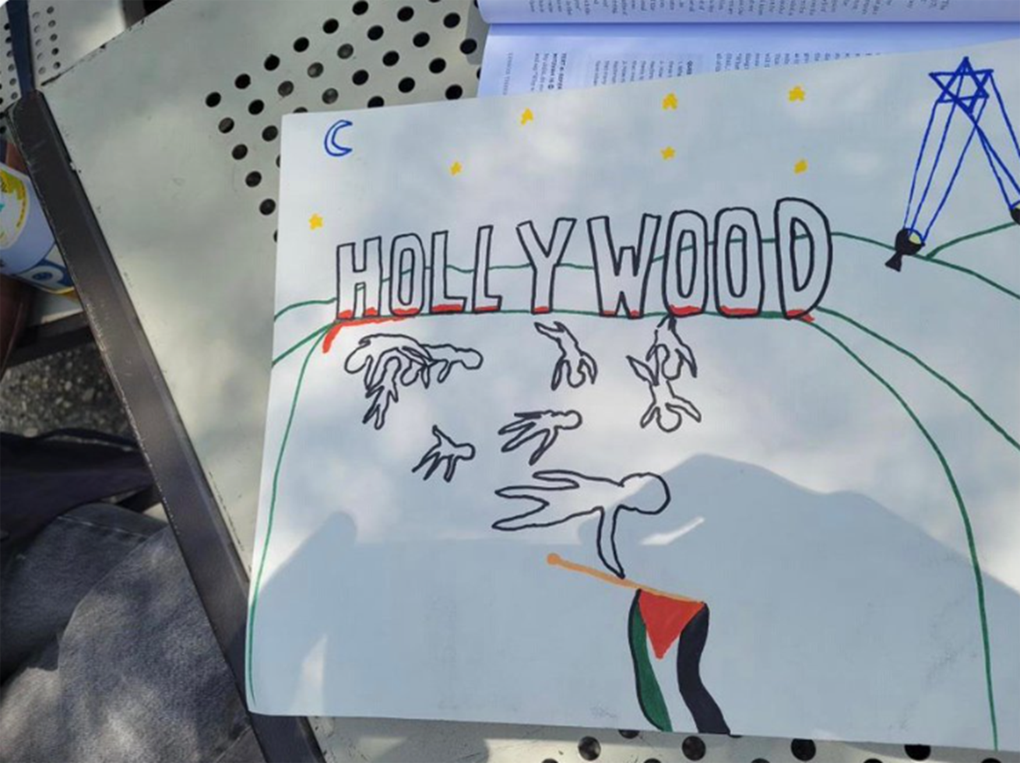
- November 2021: A pig wearing a police officer’s hat emblazoned with a Jewish Star of David was published in a zine disseminated by SJP at the University of Chicago.

- April 11, 2022: In an email to much of the student body, NYU Law SJP alleged that “the Zionist grip on the media is omnipresent.”
- Feb. 2022: A description for a webinar on Jewish-Muslim relations organized by University of California, Berkeley Lecturer and American Muslims for Palestine chairman Hatem Bazian alleged that one of the main purveyors of Islamophobia in the United States “are wealthy American Jews whose wealth is a major factor in promoting Islamophobia as a way to protect and maintain unconditional support for Israel in the US.” The description was later replaced.
- Aug. 25, 2021: In a discussion led by San Francisco State University Prof. Rabab Abdulhadi entitled “Harlem Legacies: Malcolm X, Elombe Brath and Palestine,” Professor Abdul Alkalimat of the University of Illinois, Urbana Champagne commented:
- “The congressional Black caucus, etc., these are all people who are part of the Democratic establishment. Even on the progressive wing, in quotes, of the Democratic party are tied to the funding and to the political control of these Zionist forces, and they're really the face of U.S. capital. What we're really dealing with here is the strategy of U.S. capital. And Israel and Zionism is really one of their tools in their toolkit for maintaining their control.”
- November 2021: Advertising an event, Vassar SJP posted fliers with a caricature drawn by cartoonist Eli Valley (who is Jewish) appearing to depict a Jewish person as a parasitic creature, reminiscent of historic antisemitic depictions of Jews.
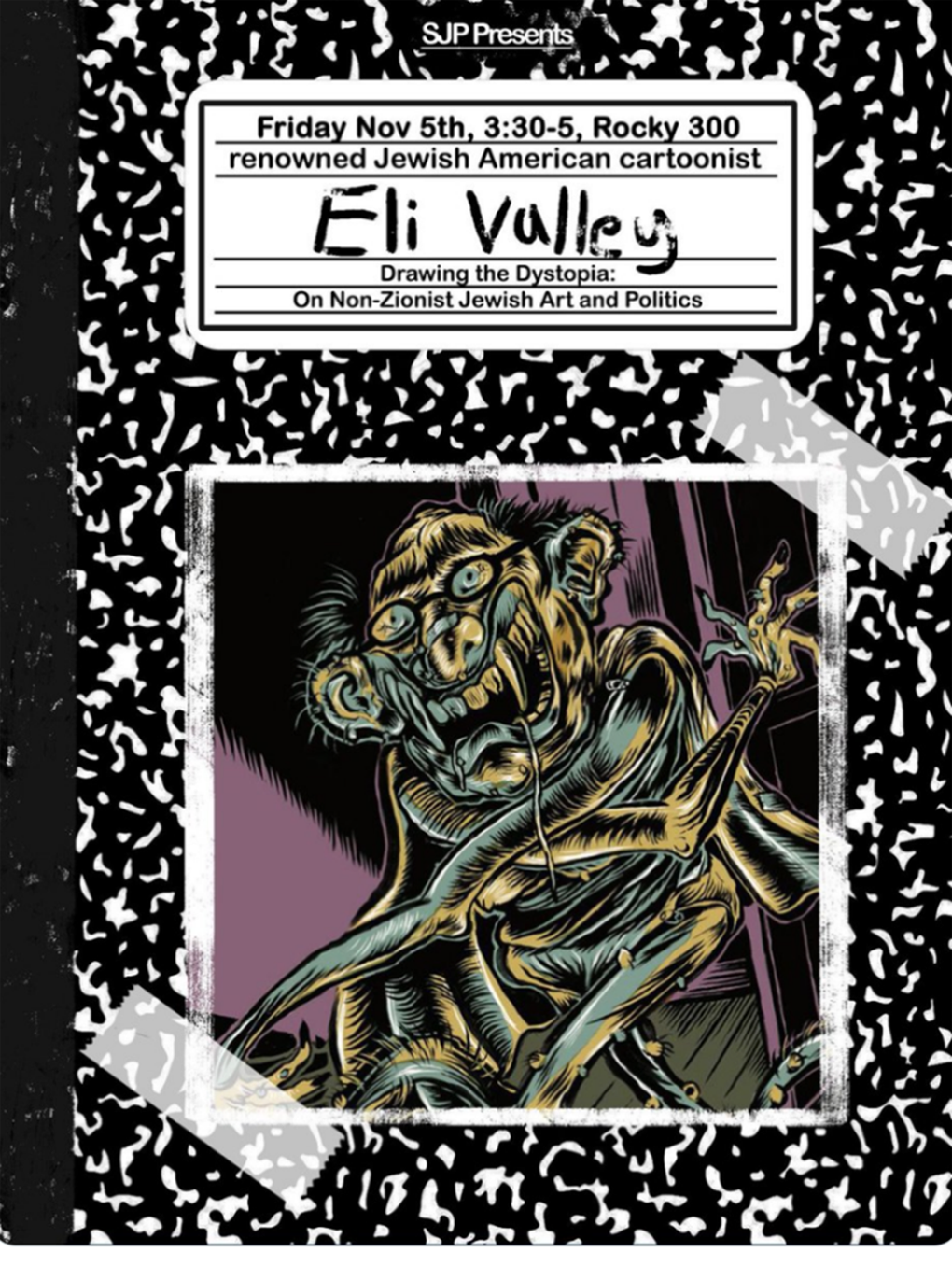
Funding and Capacity Building of Campus Anti-Israel Groups
As official student clubs, SJP and JVP receive much of their funding from student government resources, which generally are funded by student activity fees. They also are supported by outside donors, including foundations. JVP receives significant funding from the Rockefeller Brothers Fund (RBF). SJP’s fiscal sponsor is the Westchester Peace Action Coalition (WESPAC) Foundation. SJP also continues to be advised and supported by American Muslims for Palestine (AMP).
Funding
Rockefeller Brothers Fund
The Rockefeller Brothers Fund (RBF) is one of the most prominent private foundations in the United States. RBF grants constitute some of the most significant institutional giving to Jewish Voice for Peace, giving it the veneer of mainstream activities, despite its long history of outrageous and alarming rhetoric. JVP has been granted $620,000 from RBF since 2015. In July 2021, JVP was granted a $165,000 two-year grant, down slightly from its previous grant cycle’s $175,000.
In 2015, RBF openly considered divesting their portfolio from Israeli companies, though it appears to still have small holdings in several Israeli banks and other targets for the BDS movement, such as Raytheon, Boeing, CEMEX, and Puma. In the past, RBF has granted significant funds to other anti-Israel groups, such as Adalah Justice Project, Middle East Children’s Alliance ($150,000 for a two-year cycle in 2021), and the Institute for Middle East Understanding ($340,000 from 2017-2020).
Several RBF anti-Israel grantees have engaged in inflammatory and sometimes antisemitic rhetoric Notably, in May 2021, RBF awarded a 24-month $150,000 grant to the Tides Center, earmarked for Adalah. Since 2018, it has received $410,000 from the foundation. This pro-BDS advocacy group has a pattern of engaging in rhetoric that is prejudicial toward Zionists or plays into violent or antisemitic tropes. Examples include:
- July 2014: Adalah Executive Director Sandra Tamari: “Resistance rockets fired from the Gaza Strip provide a necessary counter-discourse. The Israeli Jewish public must understand that there shall be no security so long as they do not turn their anger and frustration at their very supremacist privilege and ideological system, which is invited in the Israeli government left wing centrist or right wing... Rockets, in other words, are a radical declaration of existence and an unmediated expression of self-determination.”
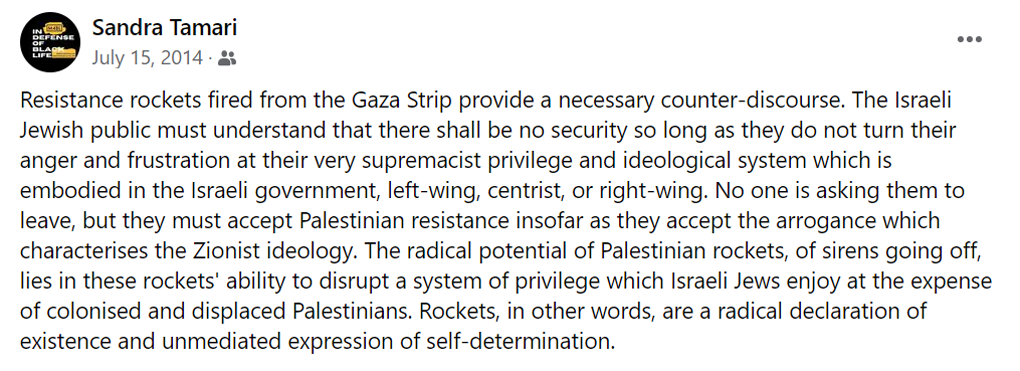
- September 2020 tweet from Adalah: “...Too often the analysis of the frightening rise of anti-semitism in the US fails to address how anti-semitism is used to derail social justice movements.” [sic]
- October 2020 tweet: Adalah praised Leila Khaled, a leader of U.S.-designated terror group PFLP, as a “freedom fighter.”
- May 13, 2021 Adalah tweet: “You can’t reform Zionism. It must be abolished.”
- April 30, 2021: From an article in Jacobin co-authored by Adalah employee Sumaya Awad: “Any solution that maintains the state of Israel as a Jewish state violates the individual and collective democratic, civil, and human rights of Palestinians.’”
RBF does not seem to have a coherent policy around anti-Zionism or anti-Israel funding, having donated large two-year gifts to J-Street, and Carnegie Endowment for International Peace.
Capacity building
Westchester Peace Action Committee Foundation (WESPAC)
WESPAC (Westchester Peace Action Committee) Foundation is a New York based nonprofit organization that funds and supports community-based and activist initiatives. Acting as National Students for Justice in Palestine’s fiscal sponsor allows for WESPAC's relationship with NSJP to remain opaqu, and it is unclear how gifts to the group are released to chapters around the country, unless they are explicitly named in grants. As SJP’s fiscal sponsor, WESPAC can accept charitable donations on behalf of SJP, acting as a pass through and giving 501(c)(3) cover to SJP, so long as SJP’s activities remain related to WESPAC’s organizational mission.
WESPAC funding streams remain unclear, though it receives grants from the Sparkplug Foundation, the Elias Foundation, Cultures of Resistance, Bafrayung Fund, and the Violet Jabara Charitable Trust, all of whom fund other anti-Israel organizations. It also receives grants from the Yonkers City Government, though it appears those grants are oriented towards projects improving the local Yonkers and Westchester community.
WESPAC, which has explicitly endorsed the Boycott, Divestment, and Sanctions (BDS) movement, is the fiscal sponsor of several other anti-Israel groups, many of which routinely cross the line into antisemitism, engaging in inflammatory and derogatory rhetoric. Such groups include Adalah NY, International Jewish Anti-Zionist Network, Palestinian Youth Movement, US Palestinian Community Network, and Within Our Lifetime. It occasionally will sponsor and participate in Israel Apartheid Weeks.
American Muslims for Palestine
For many years after AMP was established in 2005, it was a major driver of SJP activism. Though it has expanded its mission to focus more on other areas off campus, it remains invested in campus activism, with speakers such as Taher Herzallah giving talks at AMP regional conferences for students, hosting a "Campus Activity Track” at their annual conference, and initiating a fundraising drive in 2022. A statement for the fundraising drive announced that “we at AMP are increasing our support for student organizing and are working with student leaders on developing their skills to enhance the work for Palestine in America.”
- In November 2021, AMP released a report on working with Zionist institutions, providing the “American-Muslim community with a set of criteria by which to determine whether or not to work with various Jewish organizations [emphasis added].” Organizations that fail their criteria are Hillel International, American Jewish Committee, and Jewish Federations. Most synagogues would not meet their criteria, as they self-identify as Zionist or pro-Israel. The report claims that Zionist organizations that engage in interfaith dialogue are not interested in building relationships but rather in gaining “cover for their bigotry” or in pursuing “opportunities to infiltrate the Muslim community,” or more often than not, “to work towards defusing American Muslim commitment to Palestine” (page 5), treading on well-worn accusations of Jewish dishonesty.
- In August 2022, AMP released a call to action to North American imams, claiming that Al-Aqsa was once again under attack by Zionist settlers – on Tisha B’av, one of the holiest days of the Jewish religious calendar as well as a holiday directly connected to the Temple Mount. Hysteria around the Temple Mount has existed for over a hundred years in the Middle East and has been cited as a major reason for the 1929 Hebron Massacre.
Palestine Legal
Fiscally sponsored by the Tides Foundation, Palestine Legal provides legal aid to students, community members, and others who feel they have been persecuted for their Palestine advocacy. This ranges from milquetoast Palestinian solidarity to outright antisemitism.
To be fiscally sponsored by Tides, " you must have an expected annual budget of at least $250,000 with confirmed support and formal grant commitments for 100% of your budget for the first year at Tides. Tides also claims that, "Palestine Legal has been able to grow their donor base from about 50 individual donors to over 1,000 individuals in just 5 years" and that Palestine Legal people tap their social networks to find hosts for "house parties", which can bring in anywhere from 8,000-10,000 dollars.
They give a variety of know your rights sessions on campus, which offer useful overviews for one’s rights on campus. They also have a toolkit with a variety of resources for what to do if one is bothered or attacked for Palestinian advocacy.
Palestine Legal activity on campus
- They are currently assisting law students active with New York University’s Law Student for Justice in Palestine (LSJP) with an investigation stemming from an NYU LSJP email to a student listserv wherein they claimed that “the Zionist grip on the media is omnipresent”.
- The organization “has proudly supported Nerdeen [Kiswani] since she was co-president of Students for Justice in Palestine at CUNY-Staten Island in 2014.” Kiswani is a co-founder and leader of Within Our Lifetime, a vitriolic anti-Israel organization that routinely crosses the line into antisemitism.
- Before they rebranded into Palestine Legal Network, they offered a handout to people interested in setting up mock evictions on campus to do it correctly.
- Founder and director Dima Khalidi said in a 2021 talk about the International Holocaust Remembrance Alliance (IHRA) definition of antisemitism that “That’s what the IHRA does. We are not allowed to question the concept of Jewish self-determination in Palestine, in historic Palestine, and this ideology is so entrenched already in the political discourse among the political elite, and I think one of the most important things that IHRA should do is give us the opportunity to say, wait a second, you know, this is really about Zionism.” (emphasis added)
[1] Most of the incidents featured in this report are legal expressions of First Amendment protected speech. ADL is a strong supporter of the First Amendment and does not advocate for restrictions on campus speech. We do, however, feel it important to document how anti-Israel activists are using their speech in ways that degrade campus life for many American Jews.
Donor Acknowledgement
The work of the ADL Center on Extremism is made possible by the generous support of:
Anonymous (4)
The ADL Lewy Family Institute for Combatting Antisemitism
David Berg Foundation
Crown Family Philanthropies
Lillian and Larry Goodman Foundations
Klarman Family Foundation
Morton H. Meyerson Family Foundation/Marlene Nathan Meyerson Family Foundation
Charles and Mildred Schnurmacher Foundation
The Nancy K. Silverman Foundation
The Tepper Foundation
The Harry and Jeanette Weinberg Foundation
Zegar Family Foundation




